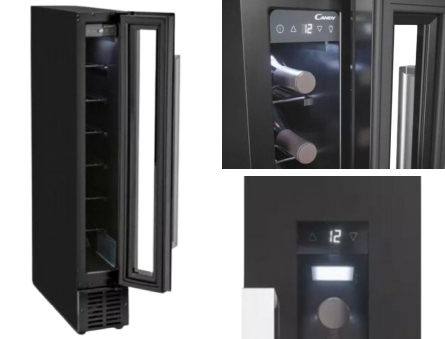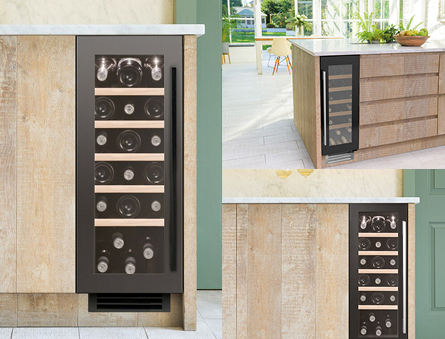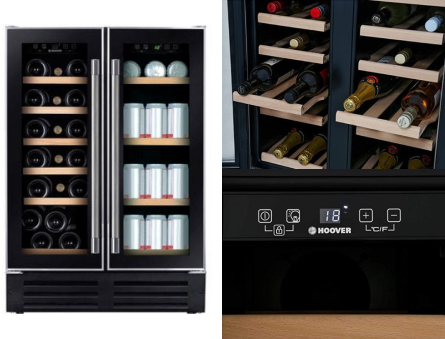Long Term Benefits Of Wine Storage
Posted by Wine Coolers on 13th May 2025
While ageing might make some of us a little tense, wine is a unique beverage that benefits greatly. Preserving your wine over time allows it to reach its full potential, transforming it into something even better. As the saying 'wine improves with age', wine storage improves with the ageing process & truly refines the wine taste, taking it to a whole new level of flavour and experience.
How to store wines? Is a question asked by the wine lovers for sure. However, to truly appreciate wine's long-term benefits, it’s essential to understand the importance of proper wine storage. Proper storage does more than just maintain wine’s condition; it can also accelerate the ageing process, preserve its quality, and potentially boost its value.
There are many advantages to long-term wine storage. The wine matures and refines over time, which improves flavour balance.
Let’s examine some factors of barrel & bottled wine storage that could help you keep your wine fresh and tastier for a long time.
Why Do Wines Need Long-Term Storage?
You may have tasted a freshly made wine and a wine that’s been aged for years; which one sticks in your memory? The aged wine, right? It’s as simple as that: with the long term wine storage it often tastes better and feels more refined.
Significantly from long-term storage wine storage, allows to develop deeper flavours and aromas which will not be present in freshly made wines. Here are some reasons why wines need long-term preservation:
- Allow to Age Gracefully: Aging gracefully is not just a fancy term for wine; storage of wine transforms flavour, aroma, and texture over time, which can elevate its quality and character. Aged wine is often considered the best, providing a richer, more rewarding experience with every sip.
- Preserve Wine Quality: Proper long-term wine storage is crucial in maintaining quality. Storing wine in a temperature-controlled environment is the best way to preserve wine for a long time. This prevents damage caused by temperature fluctuations and protects it from premature aging.
- Encourage Flavour Development: Where to store wine? To preserve and enhance the flavours. The ideal place to store wine is in the coolest part of your home, such as a closet or a covered area, away from direct sunlight and heat. This environment helps the wine to undergo some chemical reactions that enhance its flavours and aromatic compounds.
- Protect the Integrity of the Cork: You might be considering storing wine in a refrigerator, but unfortunately, it increases the risk of oxidation due to dehumidification, which can dry out the cork and compromise the wine’s integrity. The cork helps maintain the wine’s freshness by minimising oxidation. Proper long-term storage ensures the cork stays moist, maintaining the seal intact. Wine bottles are stored horizontally to avoid the cork drying out, as the air contact can spoil the wine. The same risk appears when you are storing wine in a fridge.
Storing wine, whether for a short or long period, requires specific considerations. If you wish to preserve your wine for the long term, here are a few things to keep in mind:
Minimise Exposure to Heat, Light, and Vibration
Exposing wine to heat can cause it to age prematurely and lose its desirable flavours. Light, especially UV rays or direct sunlight, can alter the wine’s flavour. Vibration can disturb the wine’s sediment and interfere with the ageing process. Hence, wine temperature for storage is very important.
The wine bottle's storage position, along with temperature and humidity control, all play crucial roles in maintaining its quality. Let’s examine them in detail.
Wine Storage in Detail - Meausres To Follow
1. Wine Temperature for Storage & Its Effects
Favourable weather conditions like the right balance of sunlight, rain, and temperature create the ideal environment for growing, harvesting, and producing high-quality wine. When the factors align in nature, the result is a wine likely to age beautifully and receive high ratings from critics.
Storage temperatures for wine ideally range from 45°F to 65°F (7°C to 18°C), ensuring that the ageing process occurs gradually. Controlling the temperature zones and humidity can prevent the wine from oxidation and is essential for its perfect maturity.
2. Importance of Wine Storage Position
Placing wine bottles horizontally is the most ideal storage position to keep the wine moist and fresh for a long period. Many wines develop sediment as they age and when stored on their side, the sediment is evenly distributed along the side of the bottle, rather than settling at the bottom, which can help with pouring clean wine later.
3. Does Humidity Matter?
Maintaining the right humidity prevents corks from drying out and keeps air from entering the bottle. Wine temperature for storage with humidity levels between 50% and 70% are ideal. This is crucial for long-term ageing, as too much oxygen can spoil a wine. Consistent cool temperatures with proper humidity and a vibration-free setting can preserve the wine’s integrity and enhance its quality.
4. How Much Light Should There Be?
UV rays and artificial lighting can degrade preservation of wine, causing it to taste different with unpleasant aromas. Keeping your wine in a dark environment shields it from this harmful exposure.
As we discussed, the wine matures and refines over time, but it improves the flavour balance only when there is the right temperature, humidity, lighting, and stable storage position.
5. How to Know Which Wines Benefit from Storage Time?
While talking about the advantages and benefits of long-term wine storage, some of you may be confused about which wine would taste better or how long it should be preserved. Since not all wines are meant for long storage, it’s good to have a deep knowledge about which wines are likely to improve with age.
Not all wines are made to be enjoyed immediately; some are designed to age over time, becoming more valuable and refined. The key to a wine’s ageing potential lies in several factors, including the grape variety, winemaking techniques, vintage, and storage conditions.
Wines that are best suited for long-term storage typically have a strong structural foundation with higher levels of tannins, acidity, and alcohol components that allow a wine to age well and develop over time. Tannins are naturally occurring polyphenolic compounds found in plants, including grapes. When wines that lack these characteristics, like most white wines and certain lighter reds, are generally best consumed within a few years of bottling.
6. Red, White & Vintage Wines
Generally, red wines are more suitable for long-term preservation than white wines. This is because red wines tend to have higher tannin levels, which act as a natural preservative, along with the necessary acidity to maintain their freshness. In contrast, white wines usually have lower tannin and acidity levels, which limits their ageing potential.
Some of the most popular red wines for long-term storage include Cabernet Sauvignon, Bordeaux blends, Barolo, Brunello di Montalcino, and Syrah. These wines can age for decades, evolving in flavour and developing a rich complexity.
Even though you have a wide variety of wines, the ‘good vintage’ wines hold a special place among those. Simply put, a good vintage refers to a year when everything came together perfectly for the grapes.
If you're selecting a wine with the intention of ageing, opting for a bottle from a good vintage is a wise choice. Wines produced during optimal weather-temperature conditions are more likely to improve with age.
Remember that ageing wine is not just about waiting, it’s about providing the right conditions and storing it correctly to ensure that the wine can develop into something truly exceptional. This also explains why age doesn’t always dictate a wine's price.
How to Store Wine After the Bottle is Open?
Once you open a bottle of wine, keeping it fresh and flavourful is essential. Wine begins to oxidise when exposed to air, but there are some simple ways to slow this process and keep your wine enjoyable for several days. Here are some smart tips for the storage of wine if it's opened:
- Reseal the bottle: After enjoying your wine, always reseal the bottle to limit air exposure. If the cork is still intact, simply put it back in the bottle. If the cork is damaged or unavailable, you can use a wine stopper or a vacuum wine pump as an alternative. These options help create a tighter seal, preserving the wine’s freshness.
- Store in a cool, dark place: To minimise the oxidation process, we have a simple yet effective technique. Storing wine in a cool, humid, dark place with minimal temperature fluctuations can do wonders for this. Avoid placing the bottle in the kitchen or near the stove, as heat can spoil the wine faster. A cupboard or wine rack away from direct sunlight is ideal.
- Refrigerate the wine: You can store wine in the fridge to extend its shelf life, but avoid leaving it in there for too long. While refrigeration helps preserve wine, prolonged storage in a fridge can dry out the cork, which may lead to oxidation. Refrigeration is a good option if you plan to store the wine for just a few days.
- Use Wine Coolers: Wine coolers are one of the best options for storing open wine. They maintain ideal temperature settings and are perfect for storing both small and large quantities of wine. Wine coolers also help prevent temperature fluctuations, which can harm the wine’s flavour.
Note: Red wines typically last 3-6 days after opening, white wines and rosés have approximately 2 days, and sparkling wines begin to lose their vigour after just a few short hours.
Our Best Wine Coolers - To Help You With Winery Storage
The struggle of how to store wine correctly? Now hold an answer. When it comes to storing and preserving wine, it is important to invest in a high-quality wine storage system. Winecoolers.co.uk is a premium and sustainable leader in wine storage solutions in the UK. We offer a wide range of modular wine storage units in various sizes, features, and prices. We suggest viewing our extensive range of wine coolers to compare various models that best suit you and your specific needs.
Candy 7 Bottles Single Zone Built Under Wine Cooler

The Candy CCVB 15 Wine Cooler adds a high-end feel to your home while giving you enough room for 7 wine bottles. With internal LED lights, you can easily change around the shelves for flexible storage and adjust the temperature to suit your wine. The UV-resistant glass keeps harmful sunlight away, maintaining optimal conditions for your vintage.
Caple Wi3126 19 Bottle Single Zone Under Counter Wine Cooler

Caple’s Single Zone under-counter wine cabinet ensures your wine is kept at the optimum temperature and humidity. It has UV-proof glass, the right level of air circulation, and low-vibration technology (so the wine isn’t disturbed until you’re ready to pour it). The cabinet has a black glass door, 5 sliding shelves, and a 19-bottle capacity.
Hoover 38 Bottle Dual Zone Integrated Wine Cooler

Store your wine properly using the Hoover Wine Cooler with a capacity of 38 bottles. The 10 bamboo shelves with adjustable feet ensure you preserve the wine bottles in the correct position and reduce vibration. Control the temperature using electronic controls and a digital display allows you to monitor and set the correct temperature of the wine cellar. The advanced charcoal filter keeps the air inside clean and suitable for wine storage.
FAQ’s
1. Why is long-term wine storage important?
Long-term wine storage allows wine to age gracefully, enhancing its flavour, aroma, and texture. Proper storage conditions prevent oxidation, preserve quality, and can even increase a wine’s value over time.
2. Which types of wines benefit most from long-term storage?
Red wines with high tannin and acidity, like Cabernet Sauvignon, Barolo, Bordeaux blends, and Syrah, benefit most from long-term storage. White and lighter red wines are best consumed within a few years due to their shorter shelf life.
3. How should I store wine after opening the bottle?
To store opened wine, reseal the bottle with the original cork, a wine stopper, or a vacuum wine pump. Keep it in a cool, dark place or refrigerate it for short-term use. Using a wine cooler can help extend the freshness. Red wines last 3–6 days, whites about 2 days, and sparkling wines lose their fizz within hours.
